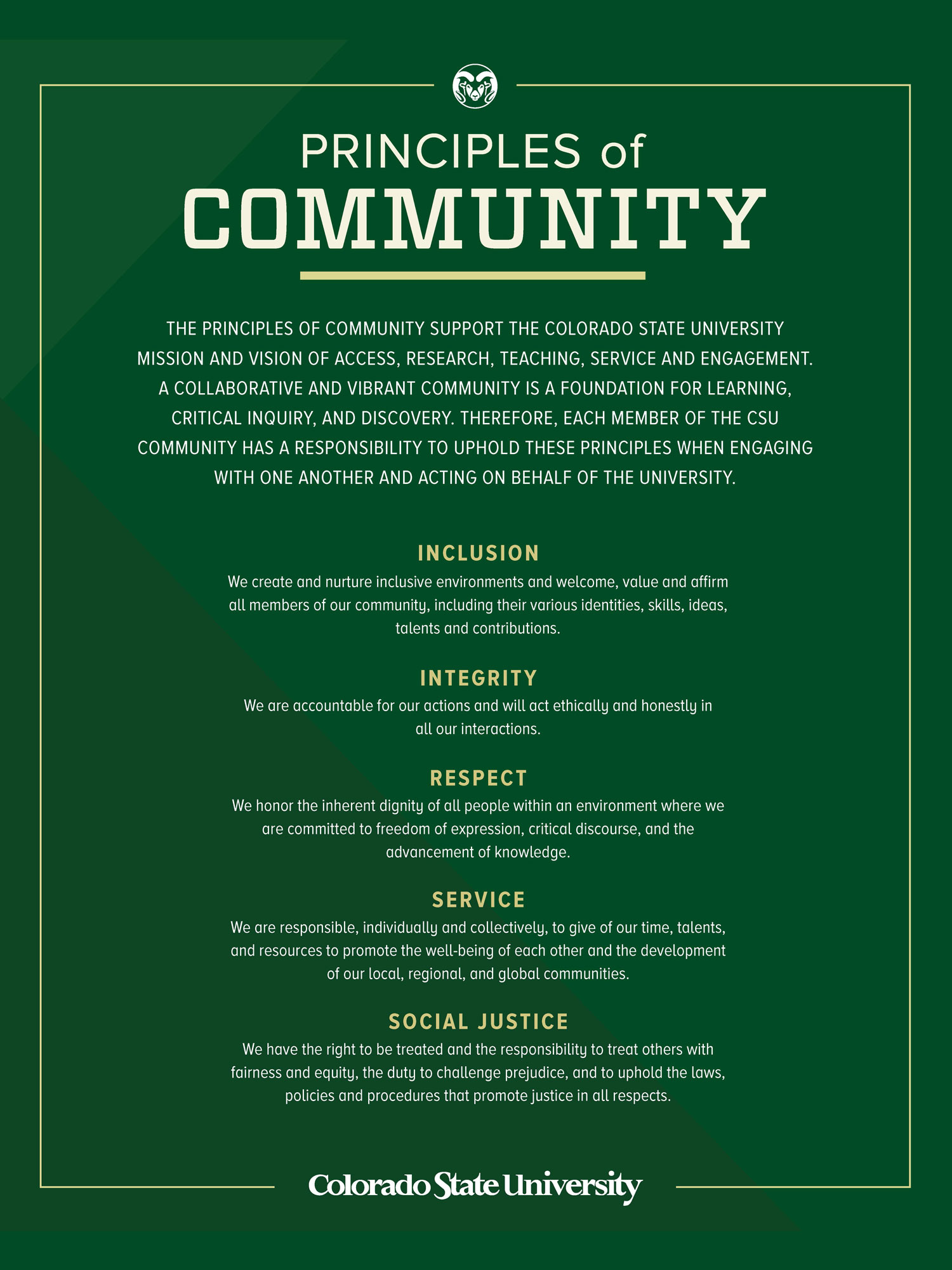Your professor wants you to have the freedom to learn.
The freedom for students to learn, explore, and challenge ideas while building and sharing your own opinions is the foundation of what is called academic freedom.
The freedom to learn. This freedom protects students from unfair treatment by instructors based on the student’s opinions and beliefs. It recognizes that student opinions are valuable and should be able to be expressed without fear of retribution by the leader of the class. At the same time, the freedom to learn obligates students to follow class assignments and master course content, even if they disagree with it.
Professors and institutions of higher education also have academic freedom that protects them in complementary but different ways.
Academic freedom protects your right to your own ideas and views.
Academic freedom protects you when you disagree with your instructor or other students in the context of class discussions and assignments.
Academic freedom gives you three specific protections:
- The protection of freedom of expression in the classroom. Students are free to take “reasoned exception” to concepts and theories presented in their classes and to disagree with opinions they hear from their instructors, even as they continue to be responsible for learning assigned course content
- The protection against improper academic evaluation. Students are shielded from “prejudiced or capricious” evaluation of their academic performance by instructors
- The protection against improper disclosure. A student’s “views, beliefs, and political opinions” shared with a professor during professional interactions should be kept confidential and should not be shared by the professor with others
Things to know about Academic Freedom:
- CSU affirms that academic freedom means that no student should be penalized because of political opinions that differ from a professor’s. Every student should feel comfortable in the right to listen critically and challenge a professor’s opinions.
- Academic freedom is granted to professors (tenured, tenure-track, non-tenure track faculty and instructors), students (undergraduate and graduate), and institutions of higher education like CSU.
- The academic freedom for these groups is not identical; rather, these freedoms are complementary, working together to ensure the academic freedom of the entire university community.
“The faculty of Colorado State University considers freedom of discussion, inquiry, and expression to be in keeping with the history and traditions of our country and to be a cornerstone of education in a democracy.”
– CSU Memorandum of Understanding on Academic Freedom
Academic freedom is not the same as Freedom of Speech.
In the classroom, academic freedom means you have the right and responsibility to participate in a welcoming and inclusive learning environment.
Freedom in Public Speech. On CSU campus, public areas like the Lory Student Center Plaza are “open to all individuals for the purpose of exercising free speech and assembly.” This means that the CSU community has the right to express their views, no matter how controversial, in public areas unless that expression is disruptive or unsafe.
Classroom Speech Is Different. According to CSU policy on Freedom of Speech, classrooms have different rules than public areas. Classrooms are considered non-public areas – that is, places “normally not intended to be open to the general public for purposes of expressive activities or gatherings.” Non-public areas do not fall under the same policies about free speech that public areas do.
That means that certain types of speech allowed in the plaza are not allowed in classrooms, including demonstrations, amplified sound, and signage, as well as “any activity that interferes with academic or operational functions.” Discriminatory or harassing speech are also not allowed.
Things to know about the First Amendment:
- Outside of the classroom, the campus constitutes a looser zone of largely unrestricted speech, as guaranteed by the First Amendment.
- True threats to, and/or harassment of, individuals are not protected speech anywhere. They each have a specific legal definition and are usually determined on a case-by-case basis.
The First Amendment to the Constitution of the United States
“Congress shall make no law … abridging the freedom of speech, or of the press; or the right of the people peaceably to assemble …”
Respect and support the academic freedom of professors.
Recognize that professors have equally valuable and complementary academic freedoms that must be respected, including the freedom to discuss controversial or challenging topics.
The freedom to teach. This aspect of academic freedom protects the right of instructors to teach their subject-matter however they choose without interference from the institution, the government, or their discipline. It recognizes professors as experts and protects them from punishment for discussing challenging or controversial topics as long as those topics are relevant to the subject of the class.
Exercise your academic freedoms within the Principles of Community.
As you challenge ideas and express yourself in the classroom, make sure you do so with a spirit of inclusion, integrity, respect, service, and social justice according to the CSU Principles of Community.
In class, controversial topics can and do arise, especially in the subjects taught in CLA. Other students may express sentiments you find noxious or abhorrent. Current events, particularly in a contentious election year, may provoke you to sincere and genuine outrage that you feel compelled to share.
Inclusion, integrity, respect, service, and social justice. These goals for how we interact with each other means considering our own voice alongside the voices of those around us in the spirit of these Principles of Community. You can and should exercise your discretion when tensions arise, potentially responding directly to offensive speech in the classroom with speech of your own, bearing in mind that your responsibility as a student is to treat others with respect and dignity.
Respect and support the academic freedoms of other students.
Be sure to respect other students’ academic freedom by listening to those you disagree with and responding with your own ideas and opinions in a respectful manner.
The central role of inclusivity. CSU’s land grant mission of access emphasizes that all are welcome to come and learn with us. When someone express ideas that offend others in class, a proper response is often more speech. Engage your instructors and fellow students in a respectful way that doesn’t hinder their academic freedom or yours.
Students should feel empowered to engage with difficult or offensive speech in a respectful and direct manner if the speech relates to class material.
Feeling welcomed in the classroom. CSU’s inclusivity policy makes instructors responsible for “creating and sustaining a welcoming, accessible and inclusive campus.” This means actively valuing all voices and contributors, while working to eliminate intentional and unintentional incidents of bias.
Our Principles of Community, along with CSU policy, emphasize students’ right to a classroom environment that allows them to think freely and learn for themselves. That means different opinions must be welcome in our classrooms, even if those opinions are unpopular.
Recognize your academic freedom is not unlimited.
When you express your disagreement with a professor or fellow student, avoid discriminatory, threatening, and disruptive language and behavior. Students are responsible for upholding the Student Conduct Code when exercising their academic freedom.
Avoid threats, discrimination, and harassment. An important aspect of participating in an inclusive learning environment is following the CSU Student Conduct Code, which prohibits behavior that “disrupts or interferes with teaching, classroom, or other educational interactions,” including “verbal abuse, threats, coercion, or other conduct, through any method of communication, which threatens or endangers the physical or psychological health, safety, or welfare of any person.”
Similarly, CSU prohibits harassment or discrimination in order to provide an environment that is free from “discrimination based on race, age, creed, color, religion, national origin or ancestry, sex, gender, disability, veteran status, genetic information, sexual orientation, gender identity or expression, or pregnancy.”
These guidelines do not mean you can’t bring up about controversial or emotionally charged topics in the classroom, but they do emphasize the need for respectful, open dialogue.

Follow up if you feel your academic freedom has been constrained.
You have the right to discuss with your professor any constraints you feel have been placed on your academic freedom.
If you feel your freedom to learn, freedom of expression, protection against improper academic evaluation, or protection against improper disclosure have been violated, you have the right to address the issue. The Student Resolution Center can assist students with how to start this conversation with their instructors.
To address issues that arise:
- First, make an appointment to discuss the issue with your instructor or professor. Ask another faculty or staff member to accompany you to the meeting if you feel the need to do so.
- For the meeting, write up a clear and detailed description of the issue to help you explain and keep a record
- If the issue remains unresolved, seek guidance from the Student Resolution Center for next steps.
CSU has several ways you can report concerns about the behavior of CSU community members, including:
- Incidence of Bias reporting - A bias incident is any conduct, speech, or expression, motivated in whole or in part by bias or prejudice that is meant to intimidate, demean, mock, degrade, marginalize, or threaten individuals or groups based on that individual or group’s actual or perceived identities.
- Student Conduct Code violation reporting – The Student Conduct Code defines University intervention, resolution options and possible disciplinary action related to the behavior of both individual students and student organizations.
- Tell Someone - If you are concerned about safety or mental health – your own or someone else’s –call (970) 491-1350 or complete the online referral form.
